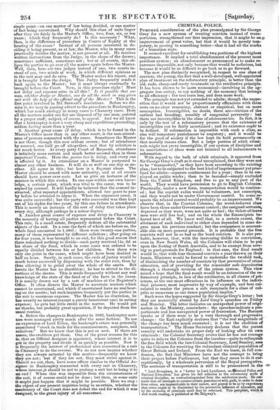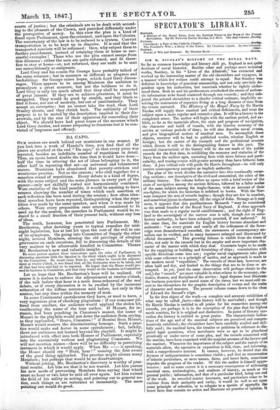CRIMINAL POLICE.
FURTHER consideration of the plan promulgated by Sir George Grey for a new system of treating convicts instead of trans- portation, strengthened our first impression, that it might be an improvement of great value, but that it would be merely tem- porary, in passing to something better—that it had all the marks of a transition state.
It seemed excellent for establishing two positions of the highest importance. It implied a total abandonment of the present moat pestilent system ; an abandonment so pronounced as to make re, currence impossible, not only because that would be nefarious, but because it would be as difficult to F. back as to go forward. The new plan distinctly recognized, in respect to one class of convicts, the young, the fact that a well-developed, well-appointed plan of treatment on the reformatory principle, is better than the old, rude, cheap-and-nasty treatment on the retributive principle. It has been shown to be more economical—involving in the ag- gregate less outlay, to say nothing of the economy that belongs to all efficiency : the tool costs less, and does more work.
The principle was not yet extended to adults; though the suppo- sition that it would not be proportionately efficacious with them rests on no clear reasoning, abstract or empirical, but on mere assumption. Incorrigibles, no doubt, there are—victims of the earliest bad breeding, possibly of congenital perversity : but there are incorrigibles in the class of adolescent too. In foot, it is only by the test of a reformatory process that the existence of incorrigibles can be fairly ascertained ; and its existence aught to be defined. If reformation is impossible with such a class, so also will temporary punishment be nugatory ; and it would be for the good of society if the law kept its hold permanently on that morally insane class. But a large portion of adult crimi- nals might not prove incorrigible, if our system of discipline-and its associations of ideas were not inimical to all inducements to reformation.
With regard to the bulk of adult criminals, it appeared from Sir George Grey's draft as it stood unexplained, that they were not to be "transported," as they have been according to the existing plan ; but to be subjected to the best kind of imprisonment yet prac- tised for adults—separate confinement for a year; then to be em- ployed on public works ; then to be banished—simply excluded from the United Kingdom, and free to go to any part of the world. They would have permission to go to English Colonies. Practically, under a new form, transportation would be continu- ed; but the convict exiles would be volunteers, not conscripts, and they would not be under Government control. In some re- spects the relaxed control would probably be an improvement. We observe that, in the Convict Colonies, the worst-behaved class have been those under Government control ; the assigned servanta, depraved as they were, were not quite so bad ; the ticket-of-leave men were still less bad ; and on the whole the Emancipists be- haved best of all. We know well that, to a certain extent, the allotment of each individual to either class depended in some de- gree upon his previous conduct; but the comparison is account- able also on more general grounds. It is probable that the free convicts will not be so bad as the bond convicts. It is also pro- bable, however, that, with the increasing dislike to convictism, even in New South Wales, all the Colonies will claim to be put upon the footing of South Australia, and to be exempt from serv- ing as gaol-grounds for England : in that case, the final result would be, that with four thousand convicts a year thrown on their hands, Ministers would be forced to undertake the twofold task, of diminishing the number of convicts by that preventive of crime education, and of providing for the remainder safe depositories through a thorough revision of the prison system. This view raised a hope that the final result would be an extension of the re- formatory principle, in lieu of the retributive, to all classes of pri- soners, as the one most efficacious in its influence on the indivi- dual prisoner, most impressive by way of example, and best cal- culated to render the prison a safe receptacle for a class of cul- prits so numerous as our dense population implies.*
Such were the hopes suggested by Sir George Grey's letter ; but they are materially abated by Lord Grey's speeches on Friday and Monday. The letter indicates an unexpected power of origi- nation in the Ministry, somewhere : the speeches indicate a pro- portionate and less unexpected power of frustration. The Baronet speaks as if there were to be a very thorough and progressive change : the Earl explicitly declares that "the real magnitude of the change has been much overrated ; it is not the abolition of transportation." The Home Secretary declares that the parent country will undertake its proper duty of looking after its own criminals : the Colonial Secretary avows that he has not courage quite to relieve the Colonies from the incubus—quite to relinquish the fine field which the late Colonial Secretary, Lord Stanley, sees in the Colonies for receiving the redundant criminal population of Great Britain and Ireland. From the Earl we learn, in full con- fession, the fact that Ministers have not the courage to bring their project before Parliament, but that they mean to do it sur- reptitiously, by a wholesale perversion of the Royal prerogative. The sentence of transportation is still to be pronounced in the
* Lord Brougham, in a "Letter to Lord Lyndhurst, on ikiminal Police and National Education," has given his full adhesion to the reformatory mode of criminal discipline, as contradistinguished from the retributive mode. He con- tends that all attempts to connect certain punishment with guilt, in order to deter from crime, are impracticable in their nature, and proved to be so by experience; that crime ought to be diminished by the preventive influence of education, and by the seclusion of criminals until they be reformed. This pamphlet, which is well worth reading, is published at Mr. Ridgway's.
courts of justice ; but the criminals are to be dealt with accord- ing to the pleasure of the Crown, and punished differently under the prerogative of mercy. In this view the plan is a kind of fraud upon Parliament, upon the criminal, and upon the Colonies. The uncertainty of the law is to be reduced to a system. Convict transportation is to be kept up in disguise. It is said that the transported convicts will be reformed: then, why subject them to further punishment, instead of retaining them at home as suc- cessful examples ? Those who use the plea cannot escape from this dilemma : either the men are quite reformed, and fit there- fore to stay at home—or, not reformed, they are unfit to be sent out surreptitiously as emigrants. Lord Grey and his cousin Sir George have probably talked of the same measure ; but in manners as different as progress and backsliding. Sir George raises hopes' which Lord Grey discou- rages. There appears to be among Ministers the ambition to promulgate a great measure, but not the boldness to do it. Lord Grey is only too much afraid that they shall be suspected of great intents. If they are to achieve greatness, it must be smuggled. They would do good by stealth, and they blush to find it fame, not out of modesty, but out of pusillanimity. They accept an enterprise ; but no sooner take the road, than Lord Stanley shouts, and they shrink back. The sublimity of their purpose is to be meted by the description implied in their dis- avowals, and by the size of their apparatus for concealing their object. We should have had great hopes of the measure which Lord Grey decries, and seems preparing to frustrate lest it be con- victed of largeness and efficacy.



























 Previous page
Previous page